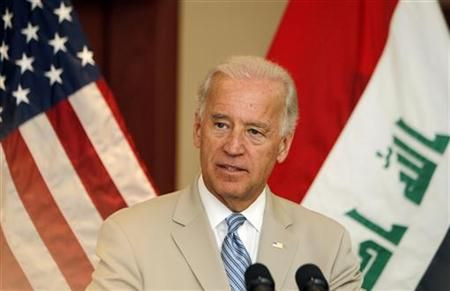U.S. Vice President Biden warns against Pakistan extremism

U.S. Vice President Joe Biden tried to dispel what he called common anti-American misperceptions in Pakistan while urging the government on Wednesday to fight growing religious extremism.
Biden's comments at a news conference with Prime Minister Yusuf Raza Gilani illustrated Washington's frustrations with what it sees as inadequate Pakistani efforts to tackle militants who cross the border to attack its forces in Afghanistan.
Hours after he spoke, a suicide bomber rammed his explosive-laden vehicle into a mosque in northwest Pakistan, killing 17 paramilitary soldiers and policemen, police said.
The mosque, which was heavily damaged, is located beside a police station on the outskirts of Bannu, a town bordering North Waziristan, a known hub of al Qaeda and Taliban militants. Officials said people were trapped in rubble.
Pakistan's Taliban, which is fighting to destabilise Gilani's U.S.-backed government, claimed responsibility for the attack.
The assassination of Punjab Governor Salman Taseer last week at the hands of his own police bodyguard for supporting changes in a controversial blasphemy law highlighted what could be a far greater danger: rising Muslim extremism in mainstream society.
Many Pakistanis thought his killing was justified.
Biden said the United States was saddened by the cold-blooded murder of a decent, brave man.
The governor was killed simply because he was a voice of tolerance and understanding, he said in a news conference broadcast live. As you know all too well ... societies that tolerate such actions end up being consumed by those actions.
Earlier, Biden called Amna Taseer, the widow of the slain governor, to express his condolences on behalf of the president and the American people.
Religious extremism among the poor and middle class often translates into suspicion towards the West. Militant groups have exploited these grievances, exacerbated by American drone attacks in the west of the country, to find support in Pakistan's poor and undeveloped hinterlands.
We know that there are those -- I am not talking about leadership -- I am talking about the public discourse that in America's fight against al Qaeda, we've imposed a war upon Pakistan, Biden said.
They (al Qaeda) continue to plot attacks against the United States and our interests to this very day, he continued. And they have -- not with your help -- but they have found refuge in the most remote portions of your country.
Pakistan often denies the presence of al Qaeda leaders on its soil.
U.S. SUPPORT
While taking Pakistani media to task, Biden also expressed continued American support for Pakistan in the form of the Kerry-Lugar-Berman Law, which provides $7.5 billion in civilian aid over five years.
A close partnership with Pakistan and its people is in the vital self-interest of the United States of America, he said. And ... in the vital self-interest of Pakistan as well.
Washington has been pushing Pakistan to help its campaign against Taliban and other militants in Afghanistan as it plans to start withdrawing U.S. troops from that country this year. Those plans are a pressing worry for Pakistan, which wants assurances that its interests in Afghanistan will be protected, and Indian influence checked.
Pakistan fears U.S. interest in Afghanistan will evaporate after a troop pullout, as happened in the 1990s after the Soviet withdrawal, and leave Pakistan with a mess next door. Washington's concern is that it won't be able to begin its drawdown if Pakistan continues to refuse to crack down on militant safe havens in its tribal areas.
Pakistan is one of the largest non-NATO recipients of American military aid -- it is expected to receive about $3 billion this year -- but ties between the two are often tense because of conflicting interests in the region.
As the war in Afghanistan drags on towards the 10-year mark, violence has been at its worst since U.S.-backed Afghan forces overthrew the Taliban in late 2001 following the September 11 attacks on the United States.
© Copyright Thomson Reuters 2024. All rights reserved.




















